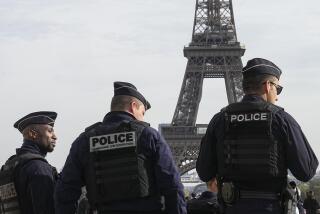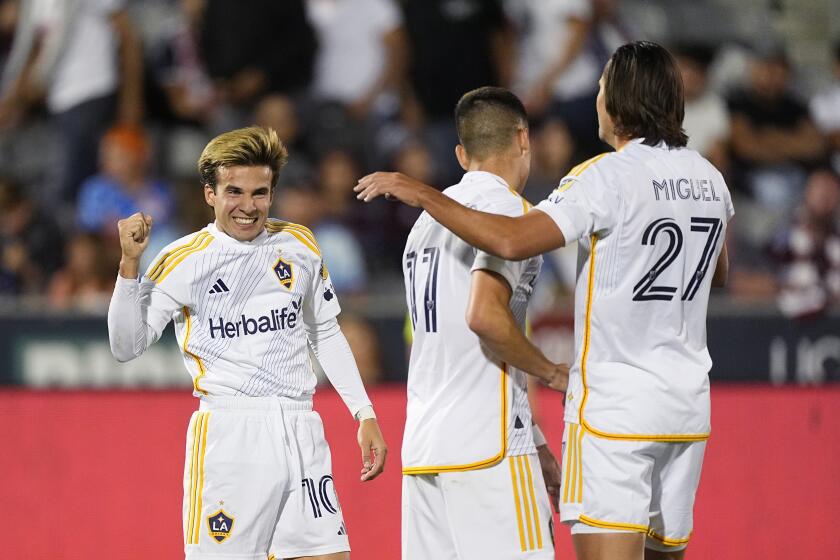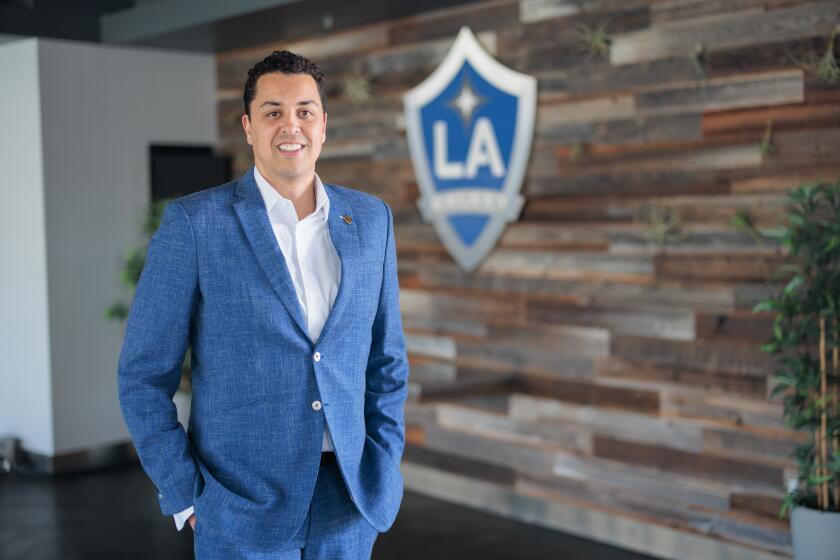Best World Cup Is a Safe One : Security: FBI veteran says plans could include barriers, cameras and restriction of alcohol sales.
The director of security for the 1994 World Cup soccer tournament said Friday that fences or other barriers between fan groups, closed-circuit television surveillance, and restrictions on the sale of alcohol within stadiums are methods under consideration to combat hooliganism.
Edgar N. Best also said that teams likely to qualify for the 24-team tournament are being ranked according to their potential security threats. High-, medium- and low-risk security plans are being completed involving the cities where those teams might play.
In his first interview since being hired in September of 1992, Best provided only sketchy information about the security plans for the month-long tournament, to be held in Los Angeles and eight other U.S. cities. Because of the far-flung nature of the event and the nationalistic emotions generated by the World Cup, the plan is expected to be the most comprehensive ever for a sporting event.
Best is a 22-year FBI veteran whose last posting was as the agent in charge of the Bureau’s Los Angeles office. He was the director of security for the 1984 L.A. Olympics.
Although he has been on the job for nine months, Best has not granted any interviews and World Cup officials have been reluctant to discuss security preparations.
During a news conference this week with European and South American journalists, World Cup chairman Alan Rothenberg was peppered with questions about the security plans. When Rothenberg was evasive, World Cup organizers were charged with underestimating the threat of fan violence.
Best acknowledged that perhaps not enough information had been released to the public. But he stressed that World Cup officials were aware of the potential for violence and were prepared for the worst.
“We know that hooligan elements will come to the United States,” Best said. “To be honest with you, our borders are very porous. That’s the simple answer. It’s impossible to tell people that our borders will be sealed.”
Best is working with European police to compile a list of soccer troublemakers.
World Cup officials have said that whatever U.S. laws apply will be used to prevent identified hooligans from entering the country. For example, convicted felons may be denied entrance. But Best said that, realistically, it would be impossible to monitor the movement of every potential hooligan.
Best again ruled out the strong show of force favored by Italy, which played host to the 1990 World Cup. There, more than 4,000 police and military personnel, many carrying machine guns, were placed in high-profile positions in the host cities. There were skirmishes between fans and police in some Italian cities, but there was little disruption in the stadiums.
“There are many ways to go about it,” Best said. “In Italy, they used weapons and it was effective. In England, the police don’t carry weapons and their methods were effective. We will synthesize all the information and come up with our own plan, a method that is applicable in the United States.”
The Rose Bowl in Pasadena will be the site of the final and seven other games. Other host cities are Palo Alto, Chicago, Dallas, Pontiac, Mich.; East Rutherford, N.J.; Orlando, Fla.; Foxboro, Mass., and Washington, D.C.
Best headed a World Cup delegation to England last month to observe security at the World Cup qualifying game between teams with long-standing hooligan problems: England and the Netherlands.
The group also attended English club matches at Leeds, Sheffield and Manchester, and met with local police. In London, Best observed the security preparations for the game at Wembley Stadium. Although violence was expected, the crowd was enthusiastic but manageable.
Best said the progress on identifying potential problem teams is somewhat stalled because only the United States, as the host country, and Germany, as defending champion, have qualified for the World Cup. After the other 22 teams have qualified in November, Best said, more specific plans can be drawn.
World Cup officials will not disclose the budget for security, but Best had a budget of $80 million for the 1984 Olympics. Potential problems and costs of protecting fans and athletes have escalated since then, however. Organizers of the 1992 Barcelona Olympics used 40,000 security personnel at a cost of $300 million.
Ultimately, Best said, no one can guarantee complete safety.
“If we were going to stage nine ballets, we would have a problem at one of them,” he said.









